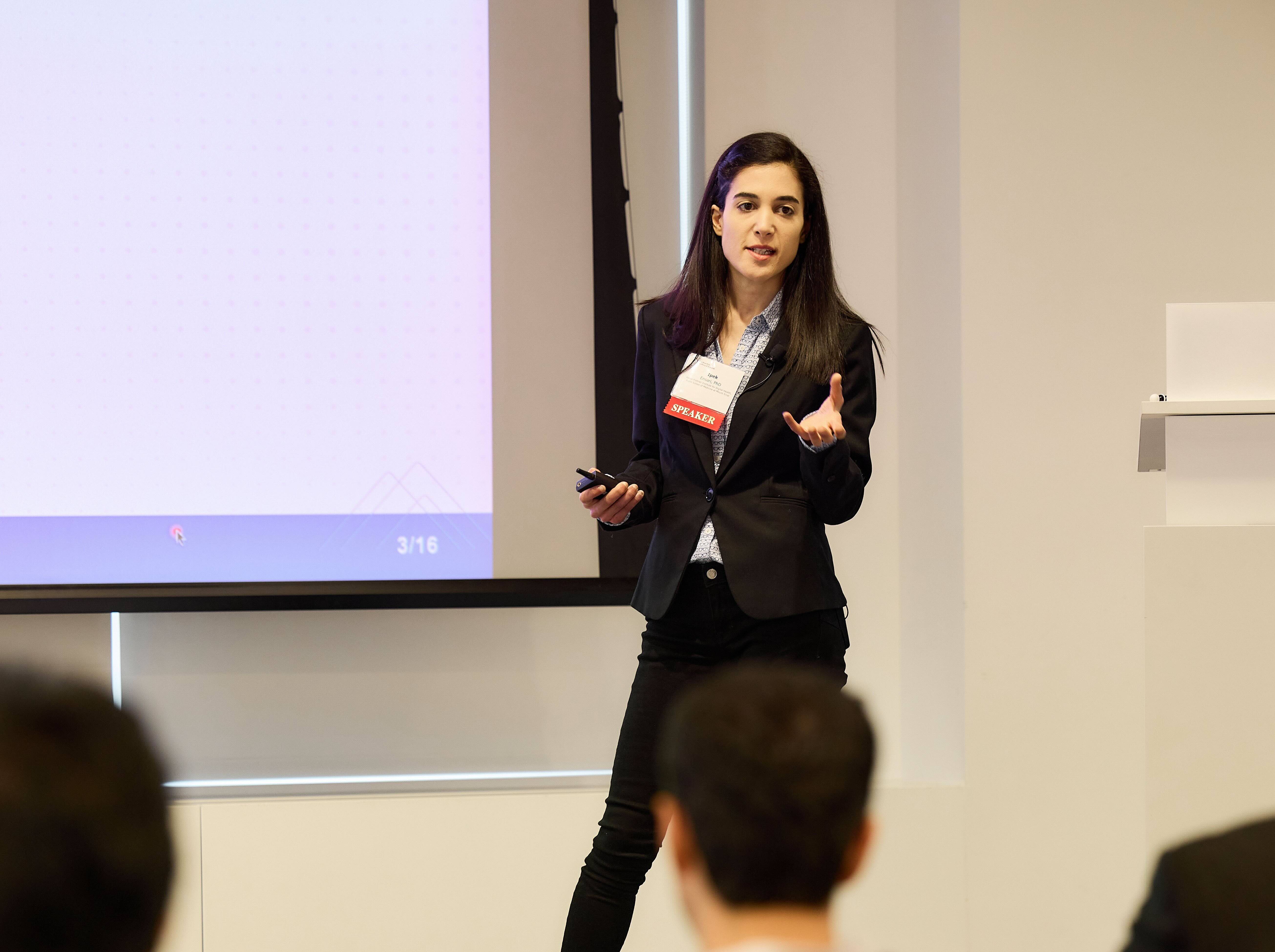
Hi, I am Ipek. I am an Assistant Professor within the Department of Artificial Intelligence and Human Health at the Icahn School of Medicine and Hasso Plattner Institute for Digital Health at Mount Sinai. Previously, I was an Associate Research Scientist at the Data Science Institute at Columbia University in New York City. My research program focuses on mHealth and machine learning-based approaches to develop clinically relevant, ecologically valid digital patient-reported outcome measures, and tools for chronic symptom self-management, grounded in women’s health conditions. (photo credit: Pam Pasco @pamashley)
Recent Updates and Announcements:
- I had a great experience participating as a panelist at the American Health Journalism Conference held June 7-9th in NYC. A recap of some of the panel highlights is now available on the event website.
- Recording of my talk at the 2024 NYR Conference is now available online. The event was held in NYC on May 16-17th. This was a particularly meaningful conference as my postdoc and graduate student collaborating on the project were also in attendance. Stay tuned for the paper coming out soon!
- We are looking to collaborate with pelvic floor physical therapists in the NYC area for an observational study with women with pelvic pain disorders. If you are interested in collaborating with our team, you can learn more through the d2prom study website.
About

By day, my mind lives in the intersection of biomedical informatics, artificial intelligence, and women’s health. By night, I am a volunteer data scientist for a non-profit social impact organization. My training background spans both patient-oriented clinical research (in the lab) and data-oriented approaches to ambulatory measurement and prediction of physical activity, sleep, physiological outcomes (e.g., blood pressure), and psychological outcomes (e.g., depressive symptoms). Mentoring students and fellows in our research projects is one of my favorite aspects of being an academic. I frequently think of the “digital data for good” motto – how we can maximize the return of benefits to our participants from their research data. In 2020, I collaborated with Camille Hollet-French, a Vancouver-based filmmaker, to make a documentary short about endometriosis. The end product is ENDOMIC (@abloodycrisis), which had its world premiere at the 2021 Slamdance Film Festival.
Research
Our lab conducts research on digital health technologies and AI methods toward improving women’s reproductive health and disorders. We have several studies that use patient-generated data obtained from various sources (e.g., wearables, sensors, electronic health records), as well as electronic health records (EHRs), to develop tools for comprehensive disease characterization and patient self-management.
1. Women’s reproductive health, participatory mHealth research
A central aim of my research is to re-tool patient-generated data via mHealth technology to better characterize conditions that are traditionally poorly documented and not well understood…
2. Digital phenotyping: Elucidating clinically meaningful variations in patient profiles
I use informatics and data-driven approaches to delineate symptom trajectories in diseases with a dynamic course (e.g., endometriosis, multiple sclerosis), and identification of self-management approaches for their effective management…
3. Symptom self-management and computational methods for patient-generated health data:
As a trained kinesiologist, a focus on physical activity and its health outcomes is a central theme across my projects…
ENDOMIC
An exhaustive meta-analytic review documenting a mysterious “women’s” issue, otherwise known as endometriosis.[1]
[1]term used to describe a clinical etiology that thus far has only been identified in primates with a female reproductive system, an anatomical structure of decidedly lower importance in comparison to those of the male primate.
In the fall of 2020, I participated in the 13th Annual Imagine Film Festival’s Symbiosis short film competition. I partnered with Camille Hollett-French to make a film that expresses our frustrations about endometriosis from multiple perspectives. Camille is a Vancouver-based filmmaker who herself has endometriosis. The end product is ENDOMIC, a “documentary” through the lens of satire about modern medicine’s and society’s take on endometriosis. Using a mock-meets-doc format, the film weaves in real patient experiences in parallel with a narrative exploration of its history in the scientific literature, disparities in diagnosis and treatment, and lack of research funding, to raise awareness and help sense-making for patients.

Dances with Films 2021
ENDOMIC is unique in several aspects. First, we crafted its satirical story-telling using content from published peer-reviewed research and real patient experiences (even though some of them sound fictional at times!). Next, it features some of my most recent academic work demonstrating how mobile health technology and direct patient input can be used to improve our understanding of endometriosis. The film also discusses inclusive medicine and healthcare, a first in this realm, and about a third of the production and acting crew include members with endometriosis in real life.
You can follow ENDOMIC (@abloodycrisis) on Instagram, Twitter, and Facebook. Click below to read more about the film’s world premiere at the 2021 Slamdance Film Festival, media coverage, and reviews.
For more information on the background and methodology of the Impact Assessment Scale (IAS) development for Entertainment to Affect Change (E2AC), you can check out the project’s Github repository. The site is regularly updated whenever there is a new iteration of the data analyses to validate the factor structure and other properties of the IAS.
News and Events

- Our recent work on developing reinforcement learning based personalized exercise recommendations for endometriosis pain management was presented at the ML4Health conference in New Orleans. The paper was presented by Dominik Meier from the Hasso Plattner Institute Potsdam, whose primary adviser is Dr. Stefan Konigorski. This research has been in the works for a long time and I am very excited that I get to collaborate with an excellent team to conduct the clinical intervention study. The pre-print paper is available on the MLR proceedings website.
- Postdoctoral fellow Eugenia Alleva, MD, presented some of the latest research on dysmenorrhea phenotyping via prompt-based learning at AMIA 2023 in New Orleans. She discussed how optimizing prompt-based tuning via keyword-optimized template insertion (KOTI) enables the adaptation of pre-trained clinical language models with only a few training examples. You can check out the pre-print to learn more about how KOTI can be applied to different clinical tasks.
- I gave an invited talk at the Hasso Plattner Institute at Potsdam University on July 13th, 2023. I had a great time meeting with the students and faculty, and visiting the Digital Health Cluster. The recording of the talk is available on the department website.
- The New Wave of AI in Healthcare conference in NYC organized by the HPIMS took place on May 23rd-24th. The briefs and recordings of the talks are available via the NYAS’s website.
- I recently came across Endonews, a website that features the latest peer-reviewed research on endometriosis, as well as interviews. It is a good read, with a lay summary and key insights on every featured article.
- My talk at the nyhackR meetup is now available on youtube. Thank you to everyone who attended in person and virtually! I greatly enjoyed meeting everyone and the questions during the Q&A.
Contact
 For media and consulting inquiries, please reach out via Linkedin or at ipek.ensari@gmail.com. For research-related inquiries, you can contact me at ipek.ensari@mssm.edu. Thank you for visiting my website!
For media and consulting inquiries, please reach out via Linkedin or at ipek.ensari@gmail.com. For research-related inquiries, you can contact me at ipek.ensari@mssm.edu. Thank you for visiting my website!
